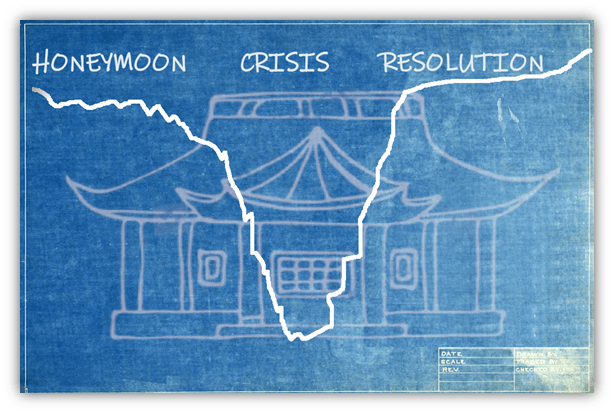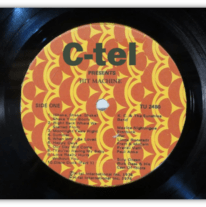A while back, I wrote an entry for this series providing some tips for tourists who are thinking of visiting Japan.
Yet in truth, I’ve never actually done a trip to Japan purely as a tourist.

My first time in Tokyo was to study abroad, for a period of nine months.
As new and crazy as everything was to me upon my arrival, I didn’t have to worry about fitting all my experiences into two or three weeks of vacation. I could take my time to see the sights. And also soak up everyday local culture rather than just the famous sites. It was a unique privilege.
Still, the process of studying abroad was a transitional experience. And the earliest portion of my time there was a lot like a time of extended tourism.

You could also call this the “Honeymoon Phase,” as it’s just a rush of nonstop delight.
During this time, even negative experiences were not so bad!

For my first full day in Tokyo, we walked single file through the busy streets of our neighborhood, Jiyuugaoka.
In much of the city, there are no proper sidewalks, just small portions of the road sectioned off to pedestrians and cyclists. With bicycles ringing and people pushing past, and with giant buses roaring right next to us, it was a lot to take in! Still, while stressful and disorienting, it’s all part of the new experience! So it was all good.
That evening, the school treated us all to dinner at an izakaya, like a gastropub, or tapas bar that serves Japanese bar food.

This one focused on more traditional cuisine. Everyone was given the same succession of small dishes, and we tried whatever came to us.
At that time, I was only just starting to eat seafood, but I chowed down on all sorts of delicious marine treats.
But also some…“fun” surprises, like a small brick of tiny fish eggs, which was dry and hard. And a steamed conch, which tasted bitter and awful to me.

Seeing my scrunched up face, a nearby Japanese student asked if I had eaten the whole thing without cleaning it first. It seems that I was supposed to take out the poop sac before enjoying. Oh well. Now I know. And it’s a story to tell!
During this early stage, even discrimination wasn’t so bad!
At least for me, a white male. Being gawked at by random people as if I were a space alien was novel. It was certainly good for me as a perspective to have. And all part of the experience as a stranger in a strange land.
But, of course, the warm glow of the Honeymoon Phase eventually wears off for all study abroad students. Reality begins to creep in. And the weight of the various challenges you face starts to feel heavier and heavier.

Japan’s many customs and practices demanded a lot of my patience and concentration to follow properly. The appeal of this eventually wore thin, and I became irritated with my daily inconvenience.
The language had also become a chore, a formidable obstacle rather than an inviting challenge. Despite my best efforts, I was functionally illiterate. And I constantly felt stupid.

I couldn’t carry on conversations for longer than thirty seconds without freezing up or making a mistake, and this really made me feel like a fool.
On top of all this, my efforts to speak and act properly were often ignored by the locals. As hard as I tried to follow the customs and to learn the language, I remained a gaijin to them. I could never stop being a bumbling tourist in their eyes.
Not only would I never be fully accepted by them, it seemed the only time people paid attention to me was when I was making a mistake. In short, everything felt impossible and hopeless.

I had entered the Crisis Phase.
Thankfully, there is a third act to the Study Abroad arc, and that is the Resolution Phase.
It’s when you feel like you’re finally living in the foreign culture, rather than simply visiting.
There is a lot of truth to the concerns of the Crisis Stage, but one’s personal insecurities serve to amplify the negative aspects, while screening out the more positive experiences and interactions of everyday life.

Life abroad can be a difficult one. But the longer you stay, and the more you persist, the better you can adapt to the demands of the culture.
Things do get a little easier with time. Certain customs that seem like a chore eventually start to feel natural. And though communication remains a serious everyday challenge, it becomes possible to gauge your progress and to set more realistic goals for further improvement.

By the time of my second school semester abroad, I was well on my way into this new phase. I still felt stupid on a regular basis, but I didn’t internalize those feelings as much.
And I also started to notice that people were complimenting my skills. Those compliments emboldened me to go out and interact even more.
My perception of Japan and its people began to change as well.
- First it was idealized novelty…
- Then it was inconvenience and alienation.

But by the time of the Resolution Phase, I had a more nuanced and realistic take on the culture.
I could bask in its wonders and conveniences, and also note its contradictions and shortcomings. More than anything, I had learned many of the ins and out of Japanese social culture, and could appreciate how different people I met acted within them.
So, after much struggling and persistence, I finally felt like a proper Study Abroad student. Yay!
But this was by no means the end of my journey…
to be continued…
Let the author know that you liked their article with a “Green Thumb” Upvote!





What a valuable experience on so many levels. Being willing to live and immerse yourself in another culture and become a stranger in a strange land can not only lead to broadening one’s perspective, but to greater understanding and empathy for others. Based on your posts I have read, it would seem that this has been the case for you.
At the very least, it got me to finally give in and enjoy popular music like Lil Jon, Beyonce, and various J-pop songs. Bring on the Bump of Chicken!
As for a broadened perspective, there’s more of this satori to come…
This is why study abroad should be required, at least in higher education. I wasn’t able to afford it and I envied those who could, but the best way to learn about where you’re from is to go somewhere else for a while. You’ll see your homeland differently when you get back.
But the empathy thing, that’s even more important.
That’s true, though the experience can make some people more nationalistic instead of more empathetic. A semester abroad had that effect on a certain relative of mine.
And that was in England! One wonders what a year in Japan or India would have done.
Good that you persevered and reached the 3rd phase. Sounds like invaluable experience, in learning about Japanase culture and in learning about yourself and what you’re capable of.
I had a little of what you talk about in my time in Mexico. Remember getting a taxi and repeating the destination I wanted over and over and the driver looking at me like I was an idiot. I was thinking surely I can’t be that far off in my pronunciation. In the end I had to pull out the guide book and point.
In my three months in eSwatini I stood out but there the culture was a lot less formal than Japan. Combining that with not having a language barrier made for an exercise in getting out my comfort zone. My introverted nature came up against constantly being engaged in conversation by complete strangers who wanted to know everything about Britain.
The language barrier was significant. Weirdly enough, some of the most frustrating exchanges I had involved English, albeit the imported kind.
Like when I went to a public bath, I requested a towel, assuming the word was “taoru.” Upon hearing my request, the woman at the counter handed me a face cloth. So I tried “ōkii (big) taoru,” expanding my hands to demonstrate the size of what I was requesting. Pretty obvious, right?
The woman looked at me as if I were a space alien. I repeated myself and tried a few more variations, to no avail.
And then suddenly she realized what I was trying to say: “aa, basu taoru!” (bath towel)
Similar thing when I tried to purchase a ticket to see “Coffee and Cigarettes.” When I tried to translate it (“kōhii to tabako”) the guy had no idea what I was talking about. And then eventually I saw how they had titled it: “kōhii ando shigaretto.” A straight up transliteration rather than a translation, just because.
But eventually you learn, and it all becomes part of your daily dance.
I have the reoccurring dream of not graduating. It’s the kanji. For me, the opening scene in which Bill Murray stares out from his car, looking mildly discombobulated by all that language lit up in neon has a nightmare quality, still.
In summer school, the instructor would play a three-minute conversation. It’s crazy, right? Five vowel sounds hurled at your senses in rapid fire style. And then he’d ask questions about the conversation. I honestly don’t know how I got through it. At various times, I considered starting the foreign language requirement all over again, while simultaneous taking 600-level English classes for no credit, just audit with the permission of the English department. I took German in high school. That was a lot more fun.
I envy people who can read a novel in a second language.
I’m in complete utter awe of people who can write novels in a second language.
That’s a shame that your experience negatively impacted your perception of that intro scene in Lost in Translation. I have my issues with that film, but I thought that scene perfectly captured the feeling of riding into Tokyo while completely jet lagged. It’s like a dream world.
We’ll see a post about someone who can write novels in a second language in a few weeks…